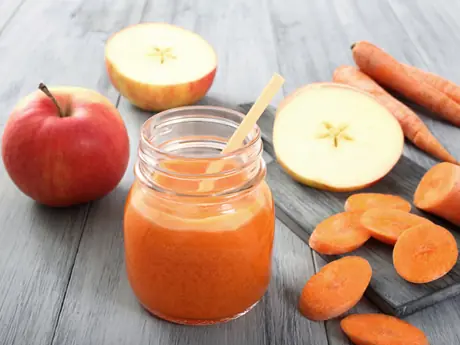
In Chapter 12 of my new book Beyond Training, I fill you in on all the hidden things you should avoid on race day if you want to maximize performance without gastric distress.
But what kind of crucial, performance-enhancing or gut-stabilizing foods or nutrients should you actually eat before your workout or race? Here are five of my top recommendations.
More: 5 Tips for Proper Pre-Race Food Prep
1) Blended and Juiced Foods
When you blend or juice foods, you make things much easier on your digestive system, allow foods to empty more quickly from the stomach. Blending or juicing also helps to pre-digest the food so your body doesn't have to work as hard during digestion.
This frees up precious energy for you to be able to devote to breathing, moving and contracting muscles. Cell walls are broken down and nutrients are quickly released (especially from greens like kale, or dark root vegetables like beets and carrots.)
When you use these strategies, you're essential "chewing" your food much more thoroughly than you may have been able to with your teeth, and many foods that would normally have given you digestive trouble – such as a bunch of carrots or a big spinach salad – will digest just fine when blended or juiced. So I recommend a high-speed quality blender such as a Vitamix or OmniBlender, an Omega masticating juicer, and a Magic Bullet for travel.
Two of my "go-to" recipes for pre-workouts are a kale smoothie blended with coconut water or coconut milk, or a carrot-ginger-lemon juice with a touch of olive oil added in.
More: 4 Delicious Recovery Smoothies
2) Small Amounts of Caffeine
Caffeine can definitely help with sports performance. This may be why 1,3,7-trimethylxanthine, more popularly known as caffeine, is the world's most consumed natural pharmacological agent. Caffeine has been shown to improve endurance and time trial performance in cyclists, increase endurance in runners, and improve performance times and boost power in rowers.
Caffeine has also been shown to improve performance in cycling and running events lasting 5 minutes or more, and to increase power output, speed, and strength in sprint and power events lasting less than 10 seconds. Incidentally, caffeine has been shown to have no effect, and may even be a negative factor, in sprint and power events lasting anywhere from 15 seconds to 3 minutes
In tennis players, caffeine increases hitting accuracy, speed and agility, and overall success on the court. And players reported feeling more energy late in their matches. Caffeine also reduces your "rating of perceived exertion", or how hard you feel like you're actually working – which essentially causes you to push harder and faster.
Unfortunately, most people are averaging 238 milligrams of caffeine every day, which is the equivalent of 2 to 3 cups of coffee, and 20 to 30 percent of people consume an enormous 600 milligrams of caffeine daily—with about 71 percent of it coffee, 16 percent from tea, and 12 percent from soft drinks and energy drinks.
And when we shove high amounts of caffeine into our system prior to a workout or race, it's just extra stress on the adrenal glands. So as mentioned earlier, I recommend a minimum effective dose of caffeine– about 0.5 milligrams per pound of body weight or 1 milligram per kilogram of body weight. For a 150-pound athlete, that's the equivalent of a small cup of coffee.
I personally just add one serving of X2Performance Natural Sports Energy about 30 minutes prior to my race, and repeat for seven days leading up the race.
- 1
- of
- 3
About the Author










Discuss This Article